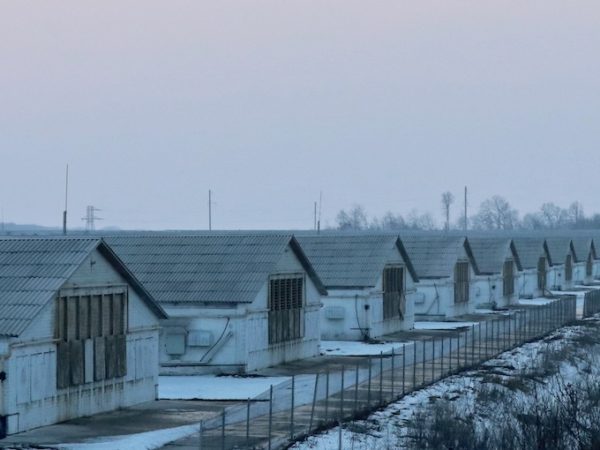Ukraine: Agro-Industrial Poultry Farm
-
Overview
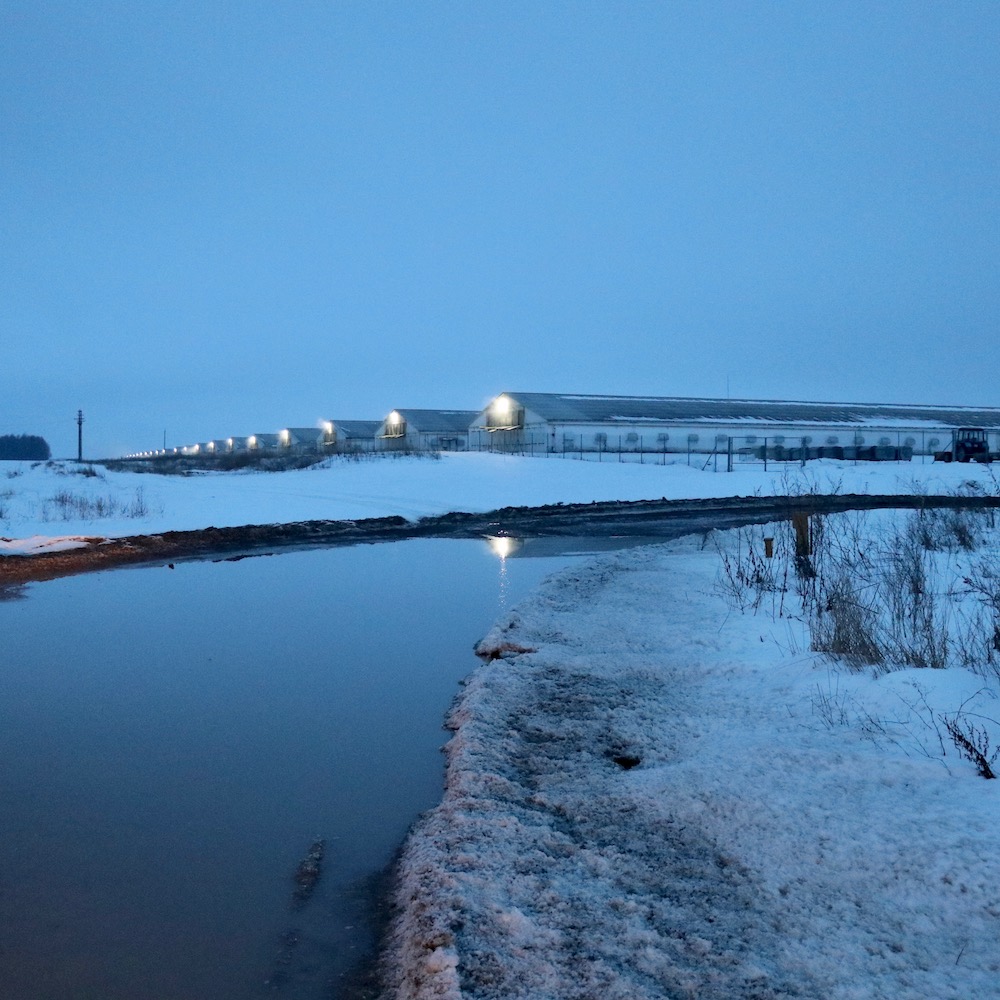
Existing poultry houses within the VPF.
For villagers living near “the largest poultry farm in Europe,” the Vinnytsia Poultry Farm in Ukraine is omnipresent. The farm is massive and only continues to expand, with the capacity to house over 39 million chickens at a time, tightly quartered in hundreds of chicken houses. And chicken rearing is just the beginning. The farm and associated agro-industrial operations also include a slaughterhouse, manure storage, and wastewater treatment plant, plus over 25,000 hectares of cropland and facilities to grow and process feed for the chickens.
Some report that these operations are making village life untenable. Towering buildings emit dust and foul odors at all hours of the day. The chickens produce over 224,000 tonnes of manure each year, which is stored in the open air for months at a time before being spread on company cropland. Constant, heavy vehicle traffic has caused damage to homes and village roads. Details of the environmental impact of the whole operation have not been fully investigated or disclosed, but local water testing initiatives reveal dangerously high levels of nitrates in local wells: just the type of pollution impact that intensive poultry farming is known to cause. Community members fear that the farm is responsible.
Local villagers have long voiced concerns about the farm’s operations, despite intense pressure not to criticize this important source of local employment. The company’s lack of transparency about the environmental impacts of its operations have only heightened these concerns.
Frightened by the possibility of risks to their health and environment, and seeking a forum in which to access information and develop solutions, community members filed complaints on 5 June 2018 to accountability offices of the International Finance Corporation (IFC) and the European Bank for Reconstruction and Development (EBRD), which together have provided more than US$600 million in financing to MHP. The IFC’s Compliance Advisor Ombudsman (CAO) and the EBRD’s Project Complaint Mechanism (PCM) found the complaints eligible and have initiated a joint dialogue process between complainants and the company to answer their questions and address their concerns.
Between October 2018 and August 2021, community members worked hard to come to a resolution with the company. Accountability Counsel, along with EcoAction and CEE Bankwatch, attended dialogue sessions to support the complainants. After three and a half years, the dialogue ended abruptly when MHP withdrew from the process with no final agreement, and therefore no remedy.
With the close of the dispute resolution process, the two accountability offices transferred the complaints to their Compliance Review functions. In October 2022, the accountability office of the EBRD decided to initiate a full compliance investigation. A similar decision is still pending at the IFC’s accountability office.
Meanwhile, the Russian invasion of Ukraine in February 2022 and the ensuing war has only made village life more difficult for community members living near the project. Through it all, the complainants remain committed to seeking answers and addressing the impacts of the massive factory farm.
IFC – CAO complaint available in English and Ukrainian
EBRD – PCM complaint available in English and UkrainianRead more about the CAO and PCM.
As the largest industrial poultry complex in Europe, MHP’s Vinnytsia facility inevitably creates a burden for nearby communities,” yet “[c]ommunity members have little to no access to relevant information concerning the environmental and social impacts of the company and its operations.” – SOMO, Chicken Run
-
The Story
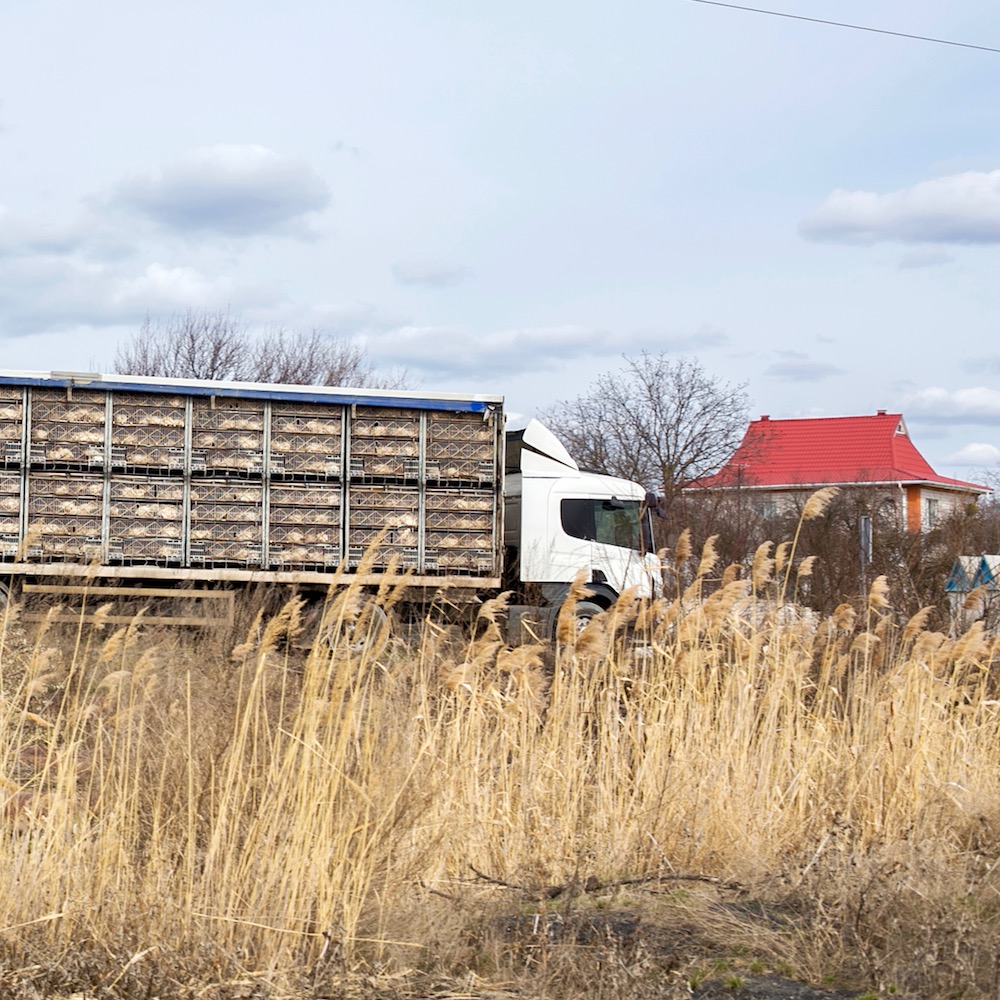
Credit: Majda Slamova, 2017
Owned by one of the wealthiest men in Ukraine, Myronivsky Hliboproduct (MHP) is the country’s largest poultry producer. It accounts for 30 percent of industrially farmed poultry consumed in Ukraine and exports hundreds of thousands of tonnes of poultry meat to countries throughout Europe, the Middle East, Africa and beyond. The company controls 370,000 hectares of cropland in Ukraine. Its vertically integrated business model means that the company controls all stages of poultry production – from growing fodder to feed the chickens until their slaughter and distribution – which has led to the creation of a series of intensive mega-farms throughout the country.
MHP boasts that one of those mega-farms, the Vinnytsia Poultry Farm (VPF) is the “largest poultry farm in Europe.”
Phase 1 of the farm began construction in 2010, and includes over 450 chicken houses, with the capacity to hold over 17 million chickens at a time. In 2018, the company began construction on Phase 2 of the Vinnytsia Poultry Farm with the intention of nearly doubling its production capacity. According to the most recent information from MHP, the farm now includes over 722 chicken houses, each holding up to 55,000 chickens.
But local villagers must contend with far more than chicken rearing. The mega-farm includes all of the facilities involved in poultry production: a slaughterhouse, hatchery and manure storage facilities, fodder production plant and wastewater treatment plant. MHP’s associated and overlapping Zernoproduct operation leases 25,000 hectares of local farmland, on which it grows grains to feed the chickens. Phase 2 has also included the construction of a biogas energy plant to power its operations.
According to planning documents for Phase 2, the fully expanded farm was expected to:
- House 32 million chickens at a time, spread across 836 chicken houses;
- Consume over 6 million cubic meters of water per year;
- Produce over 411,000 tonnes of manure per year; and
- Produce on the order of 1.5 million tonnes of greenhouse gases per year.
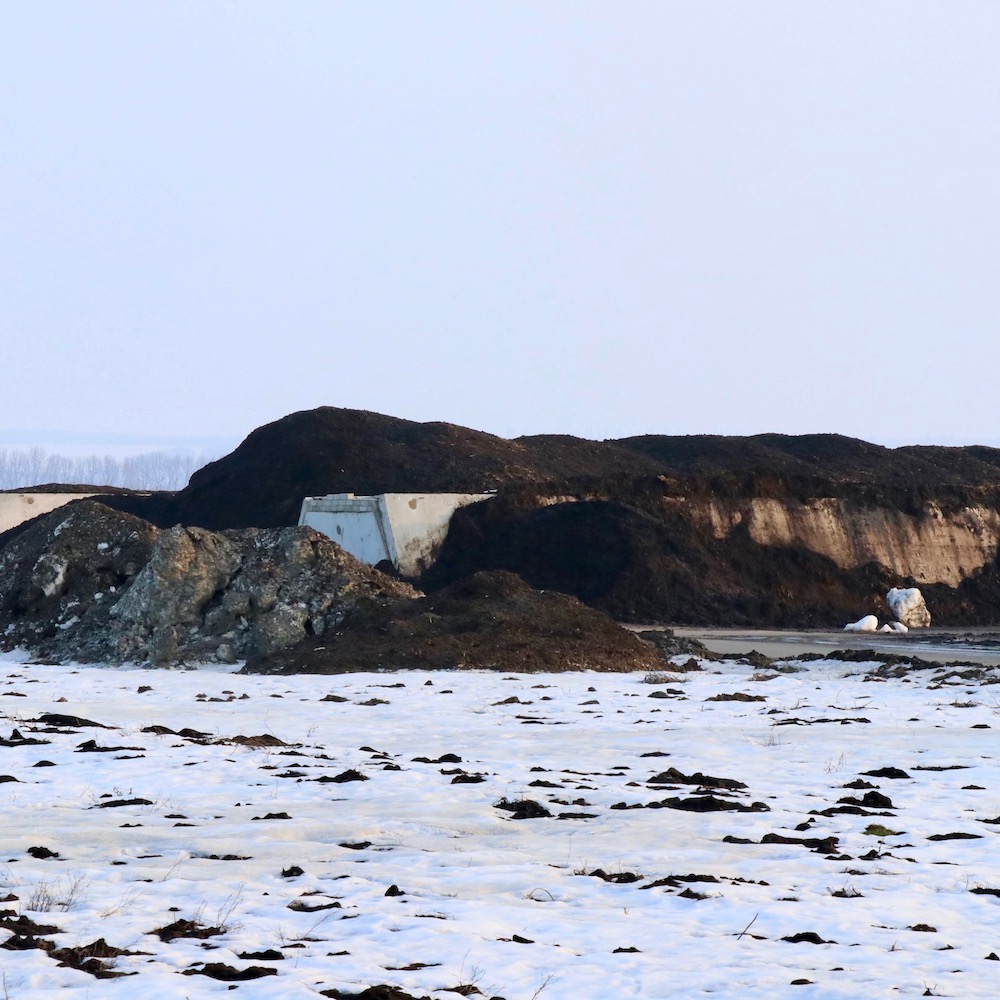
Chicken excrement lays in open manure storage containers and field piles.
Local community members have experienced negative impacts from MHP’s operations that include odor and dust, as well as damage to roads and buildings from heavy vehicle traffic. As MHP begins ramping up development of Phase 2, community members fear that these problems will only intensify. Many also fear potential pollution and health impacts from past and current practices like pesticide spraying, the storage of vast quantities of manure in open fields and application of used water from poultry farms to irrigate cropland. A citizen water monitoring project has confirmed growing problems with local water quality, but MHP continues to deny responsibility while at the same time refusing to disclose any data to support its position.
Local people report that MHP has a history of poor information disclosure, which has prevented them from understanding current and potential future environmental and health impacts. Villagers are also concerned that working conditions in MHP facilities are poor – in some cases potentially even posing health and safety risks for employees. They are also aware of reports of alleged retaliation against individuals around the country who have raised concerns about MHP operations. Many local villagers rely on MHP for employment, and the company has made significant contributions to village council budgets, creating pressure at the local level not to raise concerns or question the company. But many villagers are fed up with what they perceive to be a pattern of poor consultation, false promises and problematic MHP operations.
Despite these issues, MHP has received significant and repeated support from international development finance institutions. In 2003, MHP became the first Ukrainian business to receive funding from the International Finance Corporation (IFC), which financed the expansion of MHP’s facilities throughout the country. Since then, MHP received a total of six loans from the IFC, seven from the European Bank for Reconstruction and Development (EBRD), one from the European Investment Bank (EIB), one from the US International Development Finance Corporation (DFC), and benefitted from dozens of guarantees from Dutch trade insurance agency Atradius DSB. International public financing of MHP has totaled over US$1.2 billion to date. Most recently, in September 2023, the IFC, EBRD, and DFC approved new loans totaling $480 million to support expansion of the farm’s biogas plant and provide working capital to refinance the company’s eurobonds.
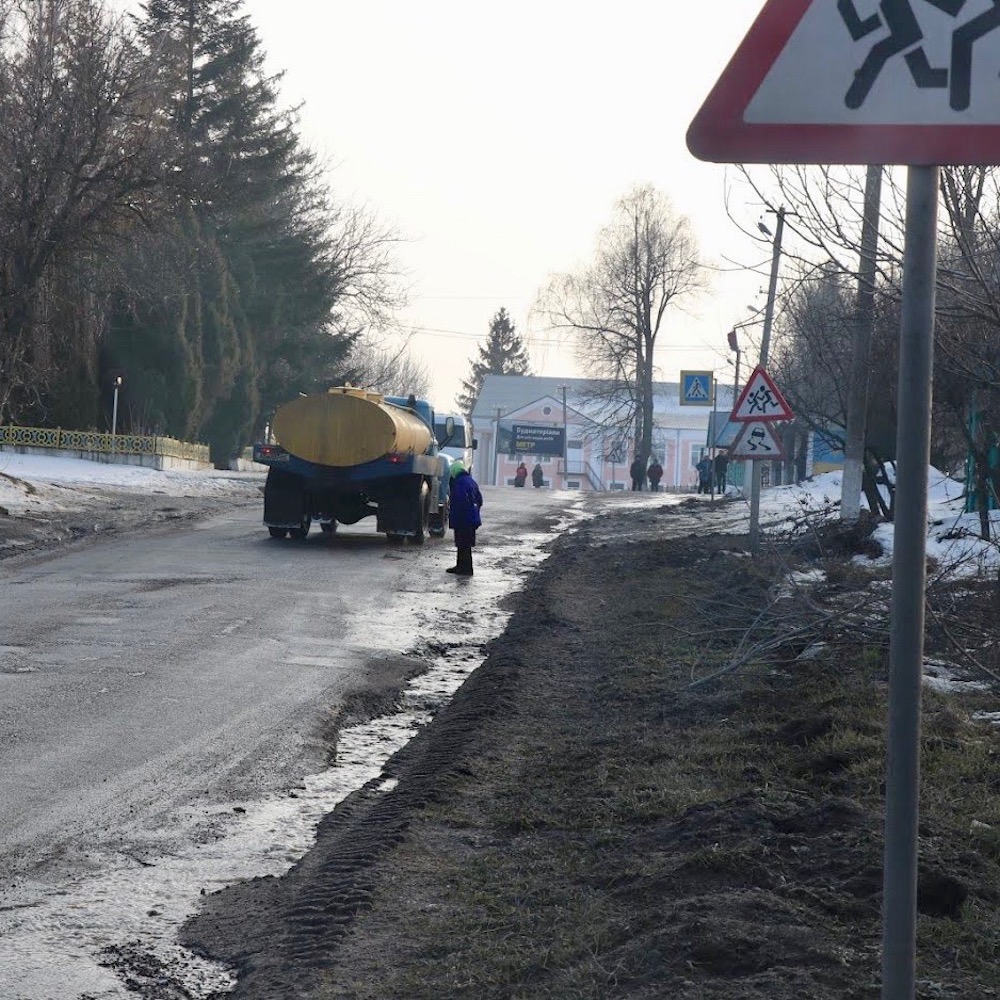
Large vehicles frequently utilize village roads creating risks to pedestrian
safety and damage to buildings.History
Since construction of the Vinnytsia Poultry Farm began in 2010, local community members have repeatedly raised concerns about inadequate information and negative impacts from the mega-farm. For many years, these concerns have largely gone unaddressed. In Olyanytsya, villagers have long been demanding an investigation into reduced water levels in wells and measures to address the impacts from road vibrations, odor, and dust caused by heavy vehicle traffic through their main road, as well as compensation for related damage to buildings. MHP agreed from the start of its operations to build a bypass road, but when a road was finally completed in 2018, its narrow design and low vehicle capacity has left some villagers questioning its adequacy as many large trucks doing business with MHP continue to prefer the road through the village.
Community members from the village of Kleban have raised concerns about MHP’s practice of storing manure in open fields for extended periods. They have repeatedly requested the company to build natural barriers around its poultry houses to minimize dust and odor impacts. Again, MHP agreed to this demand many years ago, yet has failed to honor those promises. Similarly, community members in Zaozerne, who have raised the need for more information and better consultation on the environmental impacts of MHP operations, such as pesticide spraying, and on the cumulative impacts of having so many farming facilities surrounding their village, are still waiting for their concerns to be addressed.
Community members across multiple villages complain that they have not been properly consulted about MHP’s operations, and therefore cannot be sure of their impacts. MHP has made some improvements during its Phase 2 expansions, including by developing a new Stakeholder Engagement Plan and disclosing environmental assessment documents for a few of its planned Phase 2 facilities, however many villagers continue to feel that public meetings do not allow an opportunity for real dialogue about these concerns.
“… a former village head explained how public hearings did take place, but that people were informed when it was already too late to influence the project. While villagers were informed about the company’s intentions, they did not have a say in the details of the project.” – SOMO, Chicken Run
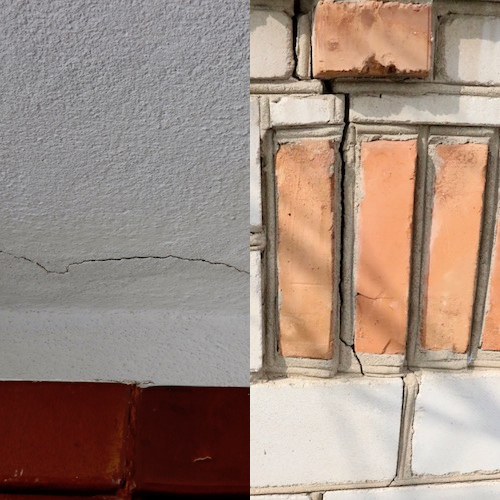
Cracks have appeared in recent years in residents’ homes close to the road, both on
building exteriors and along the walls and ceilings of interior rooms.Villagers have raised these issues directly with MHP and with local government representatives, as well as with national politicians and MHP’s international lenders, in some cases prompting ad hoc investigations or reports. For the most part, however, their concerns remain unaddressed.
Community members fear that these problems are indicative of systematic issues in MHP’s business operations, which have likely led to similar harm to communities throughout the Vinnytsia region and in other parts of the country.
Initial Steps
Villagers have been raising their concerns about MHP’s local operations for many years, not only through local public hearing processes, but also through letters and other communication directly with MHP, with local, regional and national government bodies, and with international lenders. While those efforts have led to some progress on some points, the majority of their questions and concerns have been left unresolved.
The Complaints
As a result, in June 2018, community members from the local villages of Olyanytsya, Zaozerne and Kleban filed complaints to the accountability offices of the International Finance Corporation (IFC) and of the European Bank for Reconstruction and Development (EBRD), which together have provided more than US$900 million in financing to MHP. Villagers are requesting the IFC’s Compliance Advisor Ombudsman (CAO) and the EBRD’s Project Complaint Mechanism (PCM) to facilitate a dialogue process with the company, and, if the dialogue fails, conduct compliance reviews to determine whether the repeated investments in MHP violated the banks social and environmental safeguards.
IFC – CAO complaint available in English and Ukrainian
EBRD – PCM complaint available in English and UkrainianThe complaints identify a range of concerns shared by community members from the three villages, including:
- Continuous odor and dust impacts from the significant and growing number of facilities surrounding the villages;
- Dramatic increase in heavy vehicle traffic through the villages, causing damage to roads and nearby residences;
- Current and potential negative impacts to air, water, and soil resulting from pollution and pesticide use;
- Decrease in water levels of local wells potentially linked to construction and operation of the mega-farm;
- Fear that the planned expansion of the mega-farm will cause additional impacts that they are not yet aware of;
- Poor working conditions in MHP facilities which may pose health and safety risks for employees; and
- Exacerbating all of these concerns, a lack of meaningful community consultation, with inadequate disclosure of information about environmental and social impacts and mitigation measures and a lack of any real opportunity to have a say in project design.
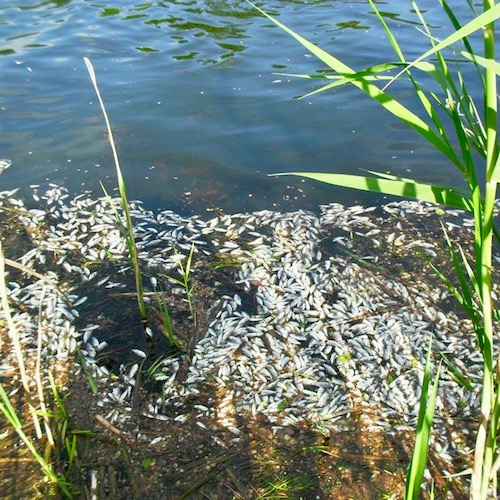
Community members reported seeing dead fish floating in the river near the
outflow pipe of the wastewater treatment. They fear that this may have been
related to the Company’s operations.The Dialogue Process
In response to the complaints, the CAO and the IPAM agreed to jointly facilitate a dialogue process between complainants and MHP. Complainants requested the dialogue process hoping for concrete steps to mitigate impacts on their villages, as well as systemic lessons to improve MHP’s operations across Ukraine. The dialogue process lasted three and a half years and included 23 meetings between community members and MHP. During the COVID-19 pandemic, these meetings continued but moved to a virtual format. Despite the efforts of the community and the progress they felt they were on the cusp of making, the company decided to withdraw from the dialogue process in July 2021, triggering its closure with no final agreement reached.
Villagers continue to report issues such as building damage from heavy road traffic through the village, farm odors, and poor water quality. Due to an ongoing lack of environmental monitoring information, they continue to fear that serious impacts from the company’s operations may be going undetected.
In July 2020, before the end of the dialogue process, the PCM was replaced by a new office at the EBRD called the Independent Project Accountability Mechanism (IPAM), which took over handling of this case from the PCM. The EBRD – IPAM and IFC – CAO published pulic reports from the mediation process summarizing the outcomes of the confidential mediation and the outstanding issues that remained unresolved.
The IFC – CAO’s conclusion report is available in English and Ukrainian.
The EBRD – IPAM’s Problem Solving Summary is available in English and Ukrainian.
Compliance Review
Following the abrupt end of the mediation process, the CAO and IPAM both transferred the complaints to their compliance review functions. Each accountability office first assessed whether the case merits a full investigation. IPAM completed its compliance assessment in 2022 and the CAO completed its process in March 2025, after a long delay due in part to internal staffing changes. Both offices decided to undertake full investigations to determine whether the bank’s investments have harmed local communities and whether the IFC and EBRD have breached their standards.
The EBRD – IPAM Compliance Assessment Report is available in English and Ukrainian.
The IFC – CAO Compliance Appraisal Report is available in English.
To better understand the quality and safety of local water resources, community members took part in a community water testing initiative across rural Ukraine, led by Ecoaction. Community representatives worked with Ecoaction to collect and test samples from various drinking water sources, such as wells and boreholes. The project also sampled from local rivers, streams, and ponds. The results of this initiative confirmed the villagers’ concerns about the contamination of their drinking water. Nitrates and other contaminants in many local wells far exceeded safe drinking levels. The levels found in the Vinnytsia region exceeded the contamination found in nearly all of the other rural communities tested, pointing to the impact of the vast scale of agricultural production in the area. Rivers in the area were also found to be highly polluted. Levels of contaminants were found to be significantly higher downstream from where MHP discharges water from its treatment plant than upstream. These high concentrations are poisonous to many species and pose a high risk to local biodiversity.
Impact of the Russian Invasion of Ukraine
The Russian invasion of Ukraine has added new complexities to community members’ struggle. While much has changed since the war broke out, many longstanding problems with the company’s operations have continued or gotten worse. State environmental monitoring has stopped altogether during the war. The few opportunities for information disclosure about new MHP developments have been discontinued under martial law. The impacts from the company’s operations have continued, as have the company’s poor relationships with local affected people. Meanwhile, MHP has profited from a recent wave of public development bank funding to support Ukrainian food security and reconstruction. Now, local villagers are calling on these banks to ensure remedy for the negative impacts of their investments in MHP.
Case Partners
CEE Bankwatch Network: the largest network of grassroots, environmental and human rights groups in central and eastern Europe, focused on monitoring public finance institutions operating in those regions.
Center for Environmental Initiatives Ecoaction: a Ukrainian member-based civil society organization that unites efforts of active and concerned people in a joint struggle to protect the environment and achieve the desired social transformations.
-
The Case
-
Mar 2025
On 17 March, 2025, the IFC’s accountability office published its long-awaited compliance appraisal report. The report found preliminary indications of harm and preliminary indications of non-compliance with social and environmental policies and recommended a full investigation into the case.
-
Dec 2023
Ecoaction produced a report following their visit to the project site, documenting the results of the latest water monitoring exercise and concerns expressed by affected villagers.
-
Sep 2023
The IFC, EBRD and DFC approved new loans to support MHP, despite ongoing complaints to the IFC and EBRD’s accountability offices. The IFC provided a US$130 million loan to upgrade MHP’s biogas plant at the Vinnytsia Poultry Farm and refinance MHP’s Eurobonds. The EBRD and DFC respectively provided US$250 million and US$100 million to MHP to mitigate the impacts of the War in Ukraine on production.
-
Feb 2023
In February 2023, the EBRD disclosed that it had granted MHP a US$100 million loan to support its production of sunflower oil. In June 2022, the EBRD granted MHP a EUR24 million loan to support costs of crop farming. These loans were granted in response to the War in Ukraine, despite the ongoing complaints about MHP’s practices to the EBRD and IFC accountability offices.
-
Oct 2022
On 17 October 2022, the IFC’s accountability office resumed work on the complaint’s Compliance Review after suspending all casework in Ukraine in March 2022 because of the Russian invasion of Ukraine.
-
Oct 2022
-
Feb 2022
-
Nov 2021
The EBRD’s accountability office, recently rebranded as the Independent Project Accountability Mechanism (IPAM), released a Problem Solving Summary, publicly announcing that the mediation process ended after one of the parties decided to withdraw from the process. The report marks the closure of the Problem Solving phase and the transfer of the complaint to the accountability office’s Compliance Review function. The report is available in English and Ukrainian.
-
Apr 2021
Complainants and MHP released a joint statement describing agreed actions to improve communication between MHP and local landowners leasing their agricultural land to the company.
-
Jan 2020
-
Jan 2019
-
Dec 2018
The first meeting of the dialogue process was held.
-
Sep 2018
The EBRD’s accountability office, the PCM, released its Eligibility Report, finding the case eligible for both Problem-solving and Compliance Review processes. The Problem-solving will be conducted first, in the form of a mediation between the complainants and MHP. The Eligibility Report is available in English and Ukrainian.
-
Jun 2018
The Compliance Advisor Ombudsman (CAO) found the complaint against the International Finance Corporation (IFC) eligible. The CAO will now begin its assessment process, during which it will work with complainants and other stakeholders to determine how the complaint will proceed. Villagers are requesting the CAO to facilitate a dialogue process with MHP.
-
Jun 2018
Villagers from three Ukrainian communities, supported by CEE Bankwatch, Ecoaction and Accountability Counsel, filed complaints to accountability offices of the International Finance Corporation (IFC) and the European Bank for Reconstruction and Development (EBRD), which together have provided more than US$600 million in financing to MHP. The complaints highlight a wide range of community concerns about potential negative environmental and social impacts from MHP’s mega-farm in Vinnytsia, including odor, dust and air and water pollution, and damage to roads and buildings from heavy vehicle traffic. Community members also report that MHP has a history of poor information disclosure, which has prevented them from understanding current and potential environmental and health impacts. Villagers are requesting that the IFC’s Compliance Advisor Ombudsman (CAO) and the EBRD’s Project Complaint Mechanism (PCM) facilitate a dialogue process with the company to answer their questions and address their concerns.
IFC – CAO complaint available in English and Ukrainian
EBRD – PCM complaint available in English and Ukrainian -
Jun 2017
CEE Bankwatch Network published “Beatings, Framings and Industrial Chicken Farms: a Human Rights Briefing on MHP Projects and International Public Finance in Ukraine,” a brief summarizing the concerning trend of community activists, including from the Vinnytsia region, facing intimidation, harassment and threats.
-
May 2016
CEE Bankwatch Network published “The problems with MHP’s expansion in Ukraine” raising issues about MHP’s current operations and planned expansion in the Cherkasy region. These findings echo the experiences of villagers who have been impacted by the Vinnytsia Poultry Farm.
-
Feb 2016
CEE Bankwatch Network and the National Ecological Center of Ukraine (now Ecoaction) published “Briefing: Problematic MHP expansion in Ukraine with EBRD support” highlighting MHP’s lack of meaningful community consultation and the inadequate assessment and mitigation of its environmental and social impacts in several regions of Ukraine, including Vinnytsia.
-
Sep 2015
CEE Bankwatch Network and the National Ecological Center of Ukraine (now Ecoaction) published “Black Earth: Agribusiness in Ukraine and the Marginalisation of Rural Communities” summarizing the results of a fact-finding mission to the Vinnytsia Poultry Farm. The report found, among other things, odor and community health risks linked to the management of manure and other waste, increased traffic and road safety risks, a lack of information and consultation with communities, resulting in mistrust and fear, and pressure on communities to lease their land for the expansion of the mega-farm.
-
Sep 2015
Centre for Research on Multinational Corporations (SOMO) published “Chicken Run: The Business Strategies and Impacts of Poultry Producer MHP in Ukraine,” a report examining the business strategy of MHP and the adverse environmental and social impacts of that strategy, as evidenced by the Vinnytsia Poultry Farm.
-
-
Impact
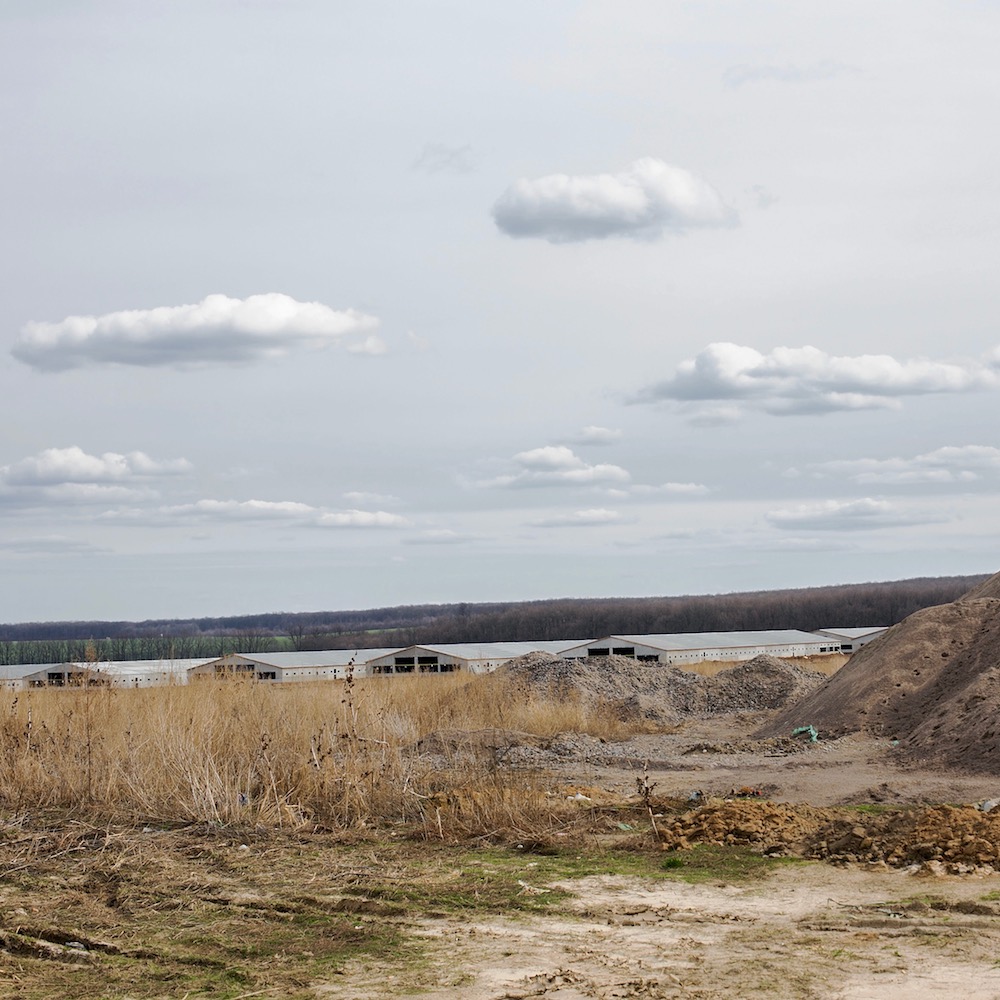
Credit: Majda Slamova, 2017
Our Impact
Despite pressure to remain silent, local villagers have been raising concerns about the Vinnytsia mega-farm’s operations for years, with support from CEE Bankwatch Network and their Ukrainian member group, Ecoaction. Over time, individual villages realized that they were not alone: many of their concerns were shared by other villages affected by MHP’s operations.
Dismissive and inadequate responses from both MHP and its international financiers left them feeling frustrated and ignored. As a result, they requested Accountability Counsel’s support to develop and pursue complaints to two accountability offices: the Compliance Advisor Ombudsman (CAO) of the International Finance Corporation (IFC) and the Project Complaint Mechanism (PCM) of the European Bank for Reconstruction and Development (EBRD). In those complaints, villagers seek a facilitated dialogue process with MHP, or, if dialogue fails, a compliance investigation into whether the repeated investments in MHP violated the banks’ social and environmental safeguards (IFC – CAO complaint available in English and Ukrainian; EBRD – PCM complaint available in English and Ukrainian)
Accountability Counsel attorneys traveled to Ukraine in 2018 to document villagers’ concerns and to prepare them for the dialogue process that they hope to establish. Accountability Counsel, CEE Bankwatch, and Ecoaction joined community members in over 20 mediation sessions held with MHP between 2018 and 2021, during which community members were able to raise issues directly with MHP representatives.
Although the company withdrew from the process before reaching a final agreement, the complainants remain steadfast in their efforts for accountability. Together with CEE Bankwatch and Ecoaction, Accountability Counsel will continue to provide support to these brave villagers as the complaints move to compliance review and as they seek solutions that will mitigate the impacts on their own communities, as well as providing systemic lessons for the banks’ lending to similar companies.
We will provide updates on our impact as we work to ensure that MHP and its international investors finally hear the villagers’ voices.
-
Case Media
Media Coverage
- 18 July 2024 How the EU is killing farmers’ livelihoods with multi-million dollar aid to a Ukrainian chicken king By Hans Wetzels, Follow the Money
- 21 June 2024 Proper EBRD policies can avoid further disgrace in Ukraine and elsewhere By Alexandre Andrade Sampaio and Caitlin Daniel, Accountability Counsel
- 26 February 2024 When European Institutions Sacrifice Farmers for Corporate Profit By Frederic Mousseau and Maya Tsingos, Oakland Institute
- 3 April 2023 Ukraine Joining the EU – An Elephant in the Room By Hannes Lorenzen and Hans Wetzels, ARC2020
- 2 February 2023 EBRD investments in Ukrainian agro-giant MHP under investigation By Vladlena Martsynkevych, CEE Bankwatch Network
- 4 April 2018 Oekraïense boeren moeten wijken voor Europees kapitaal en geopolitieke belangen By Hans Wetzels, MO*
- 8 June 2018 “Мироновский хлебопродукт” Юрия Косюка вошел в число самых опасных предприятий для окружающей среды по всему миру (дополнено) ByFocus.ua
- 23 June 2018 Living next door to 17 million chickens: ‘We want a normal life’ By Oksana Grytsenko, The Guardian
- 22 August 2018 Hoe fris is de Oekraïense plofkip
- 29 December 2018 Overspoeld door Oekraïense plofkip By Hans Wetzels, Down to Earth
- 30 July 2015 Ukraine agribusiness firms in ‘quiet land grab’ with development finance By Claire Provost & Matt Kennard, The Guardian
- 22 September 2015 Environmental organizations raise stink over MHP’s poultry farm By Kyiv Post
Blog Posts
- 9 November 2021 EBRD Accountability Mechanism starts a compliance assessment of MHP projects By Accountability Counsel
- 15 November 2018 Will the Long-Awaited Bypass Road Pave the Way to Reconciliation?
- 26 July 2018 Ukrainian agribusiness giant MHP responds to media coverage of community complaints
- 15 June 2018 MHP Complaint Found Eligible by the World Bank’s Accountability Office, the CAO
- 5 June 2018 Complaints Filed Today About Ukrainian Agribusiness Giant, MHP
- 20 July 2017 Out for Summer, Episode 2: How Public Banks Support an Unsustainable Farming Giant in Ukraine, Ignoring Communities’ Rights
- 14 September 2017 Images and graphs: Large-scale agribusiness in Ukraine and local communities
- 9 August 2018 5 Benefits of Engaging in a Facilitated Dialogue Process: the Case of Myronivsky Hliboproduct
- 28 October 2013 Guest post: EBRD financed Ukrainian agribusiness causes local insecurities By Bankwatch
Press Releases
- 5 June 2018 Press Release: Charges brought against development banks over half a billion euros for Ukraine’s largest agribusiness firm
- 29 September 2017 Activists called the EBRD to protect communities from agribusinesses
- 14 September 2015 Rural communities in Ukraine bearing the brunt of unchecked agribusiness expansion, say two new reports
From Our Partners
- October 2020 – SOMO published “A Fox in the Henhouse,” an analysis of how MHP benefits from subsidies in its home state of Ukraine while using tax havens to avoid Ukrainian taxes.
- June 2017 – CEE Bankwatch Network published “Beatings, Framings and Industrial Chicken Farms: a Human Rights Briefing on MHP Projects and International Public Finance in Ukraine,” a brief summarizing the concerning trend of community activists, including from the Vinnytsia region, facing intimidation, harassment and threats.
- May 2016 – CEE Bankwatch Network published “The problems with MHP’s expansion in Ukraine” raising issues about MHP’s current operations and planned expansion in the Cherkasy region. These findings echo the experiences of villagers who have been impacted by the Vinnytsia Poultry Farm.
- February 2016 – CEE Bankwatch Network and the National Ecological Center of Ukraine (now Ecoaction) published “Briefing: Problematic MHP expansion in Ukraine with EBRD support” highlighting MHP’s lack of meaningful community consultation and the inadequate assessment and mitigation of its environmental and social impacts in several regions of Ukraine, including Vinnytsia.
- September 2015 – CEE Bankwatch Network and the National Ecological Center of Ukraine (now known as Ecoaction) published “Black Earth: Agribusiness in Ukraine and the Marginalisation of Rural Communities” summarizing the results of a fact-finding mission to the Vinnytsia Poultry Farm. The report found, among other things, odour and community health risks linked to the management of manure and other waste, increased traffic and road safety risks, a lack of information and consultation with communities, resulting in mistrust and fear, and pressure on communities to lease their land for the expansion of the mega-farm. Also in September 2015, the Centre for Research on Multinational Corporations (SOMO) published “Chicken Run: The Business Strategies and Impacts of Poultry Producer MHP in Ukraine,” a report examining the business strategy of MHP and the adverse environmental and social impacts of that strategy, as evidenced by the Vinnytsia Poultry Farm.
Photos
-
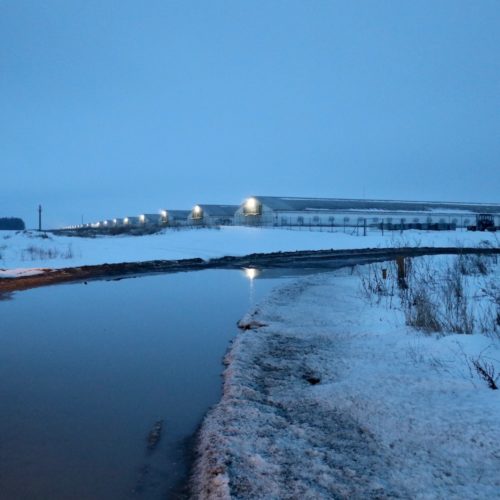 Existing poultry houses within the VPF.
Existing poultry houses within the VPF. -
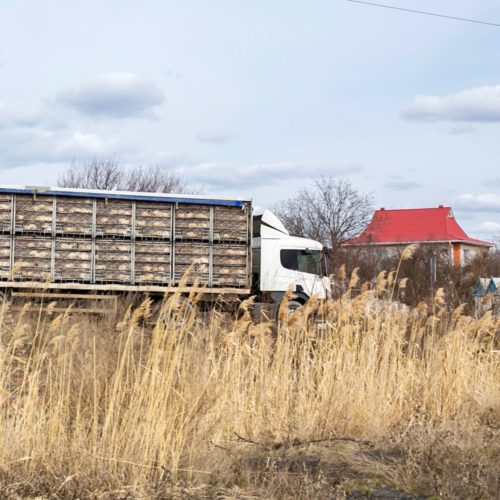 Credit: Majda Slamova, 2017
Credit: Majda Slamova, 2017 -
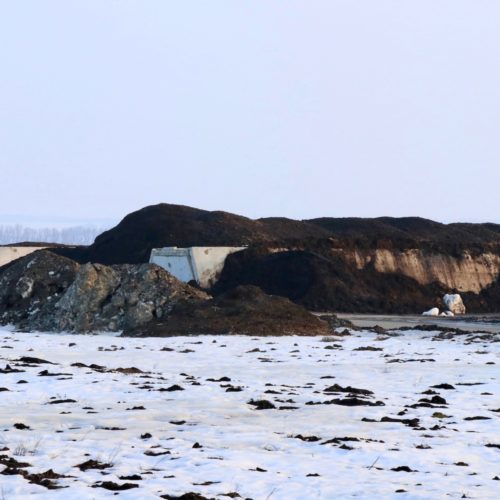 Chicken excrement lays in open manure storage containers and field piles.
Chicken excrement lays in open manure storage containers and field piles. -
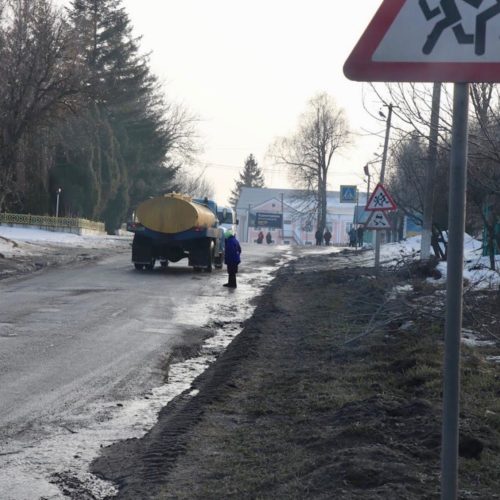 Large vehicles frequently utilize village roads creating risks to pedestrian safety and damage to buildings.
Large vehicles frequently utilize village roads creating risks to pedestrian safety and damage to buildings. -
 Cracks have appeared in recent years in residents’ homes close to the road, both on building exteriors and along the walls and ceilings of interior rooms.
Cracks have appeared in recent years in residents’ homes close to the road, both on building exteriors and along the walls and ceilings of interior rooms. -
 Community members reported seeing dead fish floating in the river near the outflow pipe of the wastewater treatment. They fear that this may have been related to the Company’s operations.
Community members reported seeing dead fish floating in the river near the outflow pipe of the wastewater treatment. They fear that this may have been related to the Company’s operations. -
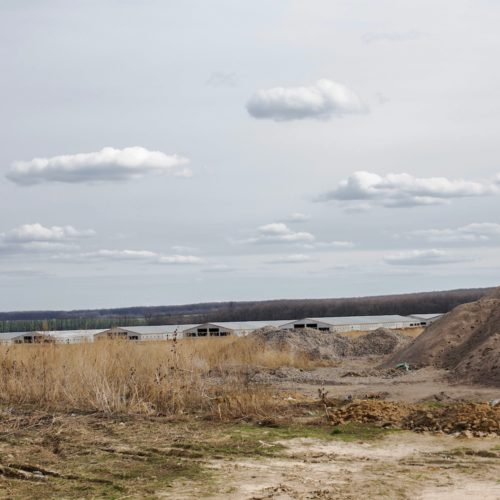 Credit: Majda Slamova, 2017
Credit: Majda Slamova, 2017

